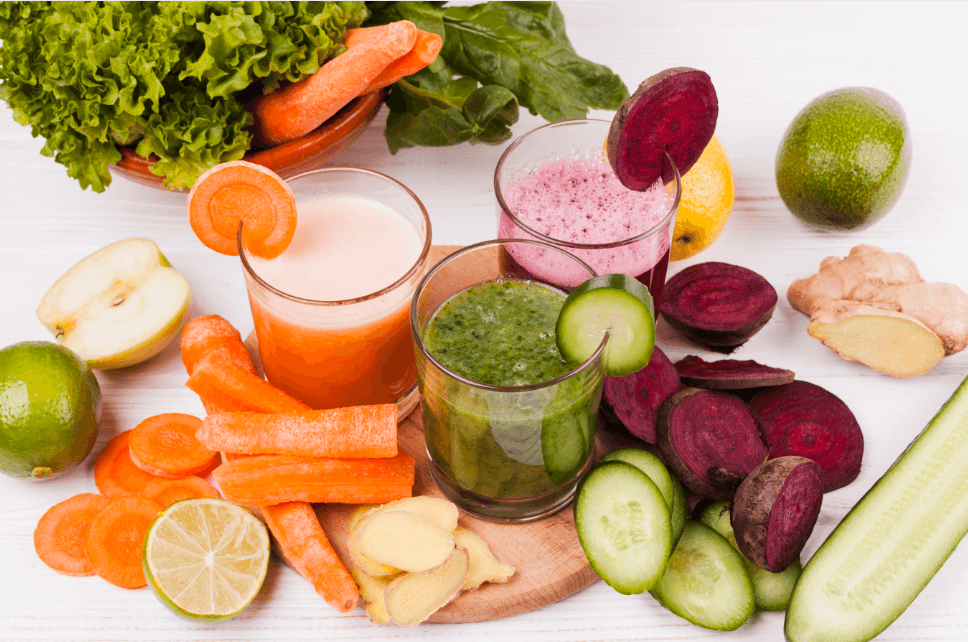6 Vegetable Juice Recipes: Benefits, Uses, and Restrictions
Vegetable juices are gaining popularity as a practical way to incorporate nutrients into your diet. They are excellent allies for health, aiding hydration, and promoting various benefits to the body. Learn everything you need to know about vegetable juices, their main characteristics, benefits, restrictions, and six easy recipes to include in your daily routine.
What Are Vegetable Juices For?
Vegetable juices aim to provide a concentrated dose of essential vitamins, minerals, and antioxidants. They serve as a dietary supplement, helping to:
- Increase nutrient intake: Ideal for those who struggle to consume the recommended daily amount of vegetables.
- Improve digestion: Many vegetables contain fiber that supports intestinal health.
- Natural detox: They aid in eliminating toxins from the body, especially those rich in chlorophyll.
- Boost energy levels: A great source of natural energy without the sugar spikes of industrialized juices.
Benefits of Vegetable Juices
The benefits may vary depending on the ingredients, but generally, they include:
- Strengthening the immune system: Vegetables like carrots, spinach, and broccoli are rich in vitamins C and A, essential for immunity.
- Improved skin health: Ingredients like cucumber and celery promote hydration and skin elasticity.
- Weight regulation: Low in calories, they’re ideal for healthy weight loss.
- Reduced inflammation: Vegetables like ginger, turmeric, and kale have anti-inflammatory properties.
- Heart health support: Regular consumption of green juices may help lower cholesterol and improve blood circulation.
Restrictions and Precautions When Consuming Vegetable Juices
Although nutritious, it’s essential to observe some restrictions:
- Excessive consumption: Drinking large amounts can overload the body with certain nutrients, like iron or potassium.
- Low fiber content: Some juices lose the fiber from vegetables, so they should complement, not replace, meals.
- Medication interactions: Vegetables like spinach (rich in vitamin K) may interfere with blood thinners.
- People with specific conditions: Those with kidney stones should avoid vegetables high in oxalates, such as beets and Swiss chard.
- Allergies or intolerances: Ensure no ingredient causes adverse reactions.
6 Vegetable Juice Recipes
1. Green Detox Juice
Ingredients:
- 2 kale leaves
- 1 green apple
- 1 piece of ginger
- Juice of 1 lemon
- 200 ml of water
Preparation: Blend all ingredients, strain if desired, and serve chilled.
2. Carrot Energy Juice
Ingredients:
- 3 medium carrots
- 1 orange
- A small piece of fresh turmeric
- 150 ml of water
Preparation: Blend the ingredients, strain, and enjoy.
3. Refreshing Cucumber Juice
Ingredients:
- 1 medium cucumber
- 2 mint leaves
- Juice of 1 lemon
- 200 ml of coconut water
Preparation: Blend everything, strain, and serve chilled.
4. Antioxidant Beet Juice
Ingredients:
- 1 medium beet
- 1 carrot
- 1 apple
- 200 ml of water
Preparation: Blend the ingredients, strain if preferred, and drink immediately.
5. Soothing Celery Juice
Ingredients:
- 2 celery stalks
- 1 pear
- 1 spinach leaf
- 150 ml of water
Preparation: Blend all ingredients and consume immediately.
6. Digestive Pumpkin Juice
Ingredients:
- 1 cup of raw pumpkin, diced
- 1 small piece of ginger
- Juice of 1 orange
- 200 ml of water
Preparation: Blend everything until smooth and enjoy.
Frequently Asked Questions
1. Can I replace meals with vegetable juices?
Although nutritious, they should not replace complete meals as they lack essential proteins and fats.
2. How much should I consume daily?
1 to 2 glasses a day are enough to complement your diet without overdoing it.
3. Can children drink vegetable juices?
Yes, as long as the ingredients are appropriate for the child’s age and nutritional needs.
4. Can I prepare juices in advance?
Ideally, consume them fresh to preserve nutrients. If necessary, store in a sealed container in the refrigerator for up to 24 hours.
Incorporating vegetable juices into your daily routine is a practical and delicious way to improve health. Try these recipes and enjoy their benefits while respecting individual needs and limitations.
If you liked this content, share it on your social networks or with friends who are also looking for health and wellness tips. Explore more tips on our website! Click here.









Leave a Reply